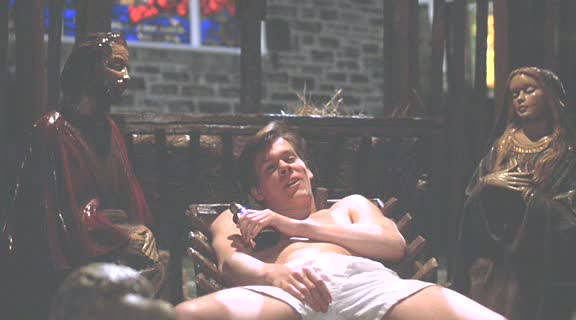How do you explain selectivity (cafeteria Protestantism) about — wait for it — the Ten Commandments? But the Allies have their ways of satisfying itching ears. Here’s the latest — positive thoughts about Nativity Scenes:
I’ve changed my views because our culture has changed. As society becomes increasingly secular, it seems to me that just about anything that ties Christmas back to the historical account of Jesus’s birth provides an important point of connection. These small displays are an opportunity for engagement and conversation between those in our communities who celebrate nothing more than Santa and those who love the message of the Jesus’s incarnation.
In fact, I’m always intrigued when someone is offended by the presence of a nativity scene. It’s quite fascinating that people can be offended by a collection of miniature ecclesiastical characters. Why do people get upset? Perhaps it’s because they recognize that what’s being said in that small scene is challenging and even personal: “This happened, this is history, there is a Jesus, and you have to deal with him one way or another.” The person who gets annoyed by public nativity scenes is someone I want to have a conversation with.
Actually, it may be that the people who most often miss the message of the nativity scene are Christians. How easy it is to rush through the whole Christmas experience—the music in the mall, the services in your church, the presents in your house—and be left with sweet sentiments but no real worship in your heart. How easy it is to sing along to “Once in Royal David’s City”—
He came down to earth from heaven,
Who is God and Lord of all.—and feel neither awe nor offense, but simply nothing much at all.
My point is that it’s not only non-Christians who trivialize Christmas. It’s us. The claims the Bible makes about the first Christmas are either fact or fiction, so they’re either awesome or offensive. They should move us to worship or to resistance. But so often Christians seem to be pursuing a pristine Christmas experience that more reflects the store-bought nativity scene than the costly and messy account of the Bible.
Calvinists did not celebrate Christmas. They avoided also any representation of any member of the Trinity. The same goes for Baptists. Until the twentieth century, non-Episcopalian and non-Lutheran Protestants didn’t do Christmas or display its wares. They only way to get around the second and fourth commandments (for the fourth, one day in seven is holy, not Jesus’ birthday) is if you so elevate feelings or evangelism and argue that rules don’t matter (sometimes). That’s more Whitefield than Edwards. In which case, the Allies can’t even honor properly their “homeboy.”
Just to keep score: justification is supposed to result in sanctification.
Good works constitute indispensable evidence of saving grace. Living as salt in a world that is decaying and light in a world that is dark, believers should neither withdraw into seclusion from the world, nor become indistinguishable from it: rather, we are to do good to the city, for all the glory and honor of the nations is to be offered up to the living God. Recognizing whose created order this is, and because we are citizens of God’s kingdom, we are to love our neighbors as ourselves, doing good to all, especially to those who belong to the household of God. The kingdom of God, already present but not fully realized, is the exercise of God’s sovereignty in the world toward the eventual redemption of all creation. The kingdom of God is an invasive power that plunders Satan’s dark kingdom and regenerates and renovates through repentance and faith the lives of individuals rescued from that kingdom. It therefore inevitably establishes a new community of human life together under God.
Maybe the Allies problem with the Decalogue is that they think of obedience too much in the context of the city and not being ye separate. Don’t want to take God’s word too far.

